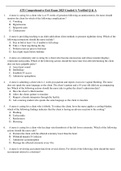Summary
Summary exemplar essays for Classical Civilisation: Greek Religion
- Module
- Greek Religion
- Institution
- OCR
Completely written out or completely planned out essays to the following 30 marker essay titles: ‘Greek religion was more personal than Panhellenic.’ To what extent do you agree? (30 marks) ‘A Greek, reading Homer or Hesiod, could hope for his gods to be fair arbiters of justice’. To wh...
[Show more]












